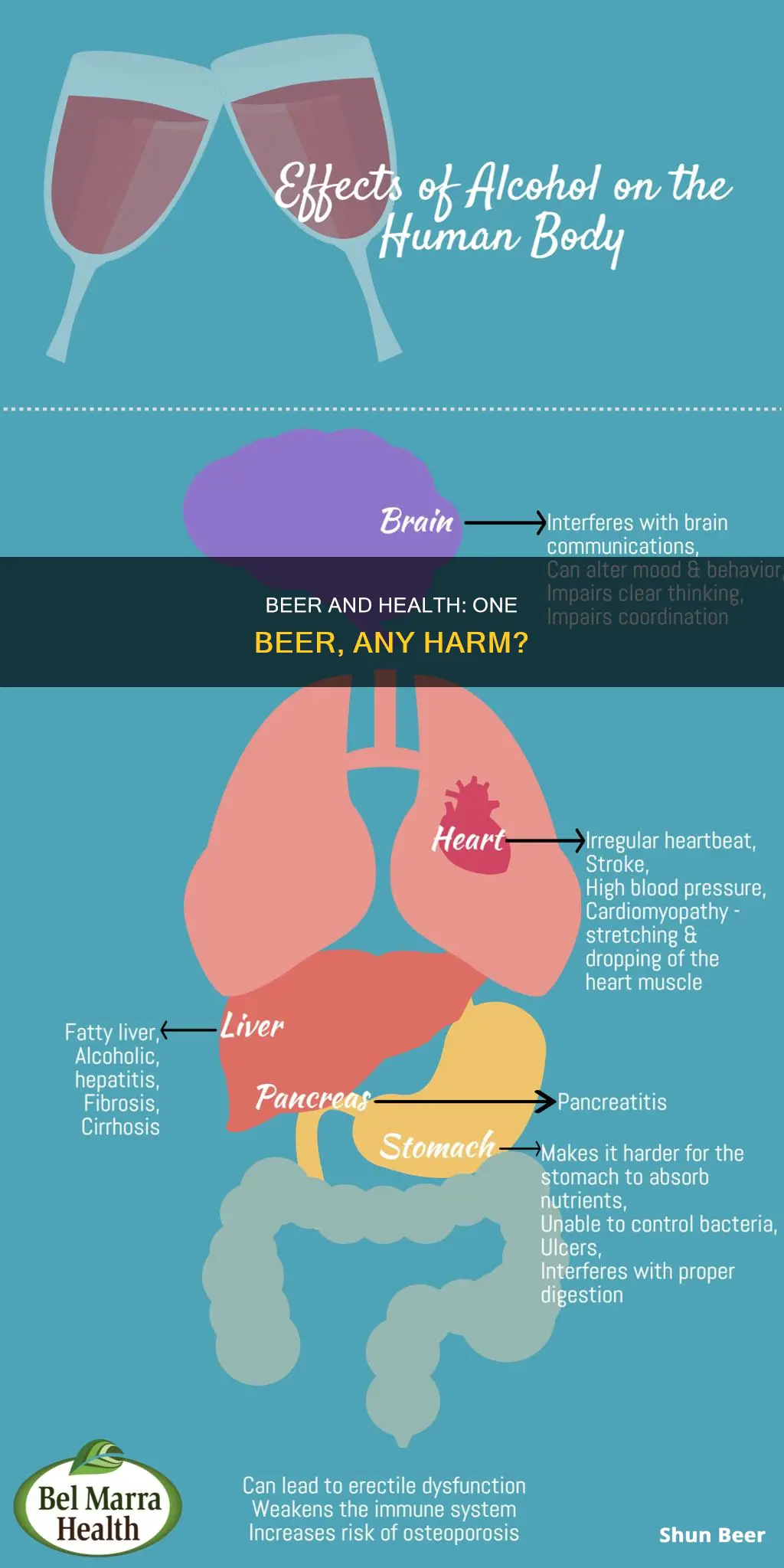
Drinking one beer a day is a topic of debate among health professionals. Some studies show that moderate drinking may be linked to certain benefits, such as red wine and heart health. However, other research shows no benefit and links moderate drinking to diseases like breast cancer and an increased risk of stroke. According to the World Heart Federation, no amount of alcohol is healthy for the heart.
According to the Dietary Guidelines for Americans, the upper limit for healthy adults is four drinks in one day or 14 per week for men, and three drinks in one day or seven per week for women. Drinking more than these amounts is considered heavy or at-risk drinking, which can lead to health problems.
A study published in the journal Hypertension found that both low and high daily alcohol intake are associated with increases in blood pressure levels, potentially increasing the risk of cardiovascular disease. The study showed that consuming an average of 12 grams of alcohol per day, roughly one 11 oz. beer, saw a systolic blood pressure rise of 1.25 mmHg. Consuming 48 grams of alcohol per day, or about four beers, resulted in a systolic blood pressure increase of 4.9 mmHg.
Another study published in Alcoholism: Clinical & Experimental Research found that people who had one or two drinks four or more times a week had a 20% higher risk of premature death compared to those who drank less often. The study also revealed that daily consumption, even when light, increased the risk of cancer.
While moderate drinking may have some potential benefits, such as a reduced risk of cardiovascular disease, the health hazards associated with daily consumption, even in small amounts, may outweigh these benefits. It is important to note that alcohol is a drug, and its consumption can affect the body and increase the risk of certain health conditions.
| Characteristics | Values |
|---|---|
| Health benefits | Decreased risk of non-fatal cardiovascular events, lower risk of diabetes in men, increased bone mineral density, lower risk of fracture in the elderly |
| Health risks | Increased risk of premature death, cancer, stroke, liver damage, cardiomyopathy, high blood pressure, increased risk of cardiovascular disease |
| Amount | Men: Four drinks in one day or 14 per week. Women: Three drinks in one day or seven per week. |

Cardiovascular health
Drinking beer has been linked to both positive and negative effects on cardiovascular health.
Positive Effects
- A 2021 review found that drinking beer was linked to increased bone mineral density for both men and women, and that drinking one beer per week was associated with a lower risk of hip fracture.
- A 2018 study found that moderate drinking was associated with improved heart health due to alcohol's potential ability to decrease HDL ("good") cholesterol.
- A 2017 study found that drinking moderate amounts of low-alcoholic beverages, such as beer, did not have as strong a diuretic effect as other alcoholic beverages like wine and liquor.
- A 2014 study found that moderate beer consumption was associated with a decreased risk of non-fatal CV events and total mortality.
- A 2012 study found that moderate beer consumption was associated with a decreased risk of diabetes in men.
- A 2011 study found that drinking less than one beer per week was associated with a lower risk of hip fracture in both men and women.
Negative Effects
- A 2018 study found that even light drinking (drinking two or fewer servings for men, one or fewer for women) was associated with a 9.3% decrease in sleep quality.
- A 2017 study found that drinking beer could cause intestinal inflammation and issues within the gastrointestinal tract and the liver.
- A 2013 study found that drinking beer was associated with a higher degree of abdominal obesity in men.
- A 2008 study found that drinking beer was associated with a higher risk of developing abnormal glucose regulation in men.
- A 2007 study found that drinking beer was associated with a higher risk of developing pre-diabetes and type 2 diabetes in men.
Beer and Running: What's the Deal?
You may want to see also

Mortality risk
Drinking one beer a day can increase your mortality risk. According to a study published in the *Journal of the American College of Cardiology*, people who had one or two drinks four or more times a week had a 20% higher risk of premature death compared to those who drank only three times a week or less often. This increased risk of death remains consistent across all age groups.
The study also found that drinking every day eliminated the benefits of reduced heart disease risk that light drinking offered. While light drinking lowered the risk of heart disease, it increased the risk of cancer.
The National Institute on Alcohol Abuse and Alcoholism considers drinking more than four drinks in one day for men and more than three drinks in one day for women as "heavy" or "at-risk" drinking. This means that drinking in this pattern puts you at a higher risk for developing health problems.
In conclusion, while drinking one beer a day may offer some health benefits, it is important to consider the potential risks associated with excessive alcohol consumption. It is always advisable to drink in moderation and consult with a healthcare professional to understand your personal risk factors.
Beer and Chronic Gastritis: What You Need to Know
You may want to see also

Cancer risk
Drinking alcohol is linked to an increased risk of developing several types of cancer. According to the National Institute on Alcohol Abuse and Alcoholism, even those who have no more than one drink per day have a modestly increased risk of some cancers. Alcohol is a Group 1 carcinogen, which is the same ranking given to tobacco and solar radiation.
Drinking one beer a day can increase your chances of developing cancer, particularly breast cancer. According to one study, the risk of most alcohol-related cancers does not increase significantly until an individual starts drinking heavily, with breast cancer being the exception. The study found that drinking one bottle of wine per week, which is roughly one glass per day, is associated with an increased absolute lifetime cancer risk of 1.0% in men and 1.4% in women. This means that if 1,000 men and 1,000 women each drank one bottle of wine per week, around 10 more men and 14 more women would develop cancer as a result.
Another study, which followed 88,084 women and 47,881 men for 30 years, found that light-to-moderate drinking was associated with a small increased risk of overall cancer. This study defined light-to-moderate drinking as one standard drink per day for women and up to two standard drinks per day for men. The study uncovered particularly strong cancer risks for women. Among females, a drink a day raised the risk of developing an alcohol-related cancer by 13%, primarily driven by breast cancer.
In addition to breast cancer, alcohol consumption has been linked to an increased risk of head and neck cancer, esophageal cancer, liver cancer, colorectal cancer, melanoma, and prostate and pancreatic cancers.
Beer and Steroids: A Safe Mix?
You may want to see also

Blood pressure
Drinking one beer a day can increase your blood pressure. A study published in the American Heart Association journal, Hypertension, found that both low and high daily alcohol intake are continuously associated with increases in blood pressure levels. This may increase the risk of cardiovascular disease.
The study found that those who consumed an average of 12 grams of alcohol per day, which is roughly equivalent to one 11 oz. beer, saw a systolic blood pressure rise of 1.25 mmHg. Systolic pressure is the force against the artery walls as the heart contracts and is a strong predictor of cardiovascular disease.
The findings may be most impactful on those who already have higher than desired blood pressure levels. The study's co-author, Dr. Paul Whelton, said, "We found participants with higher starting blood pressure readings had a stronger link between alcohol intake and blood pressure changes over time. This suggests that people with a trend towards increased, though still not high, blood pressure may benefit the most from low to no alcohol consumption."
Beer and Amoxicillin: Is It Safe to Drink?
You may want to see also

Addiction
According to guidelines, moderate alcohol consumption for adults is defined as up to four drinks per day for men and up to three drinks per day for women. Exceeding these limits is considered heavy or at-risk drinking, and it is estimated that about one in four people who drink above these levels may have an alcohol use disorder. Binge drinking, which involves consuming larger amounts of alcohol in a short period, further increases the risk of health problems.
The impact of drinking one beer per day can vary depending on individual factors. For example, age plays a role, as the risk of premature death associated with light drinking increases with age. Additionally, drinking patterns matter, and regularly drinking heavily and often is considered risky behaviour. It is recommended to have days without alcohol to allow the liver to recover.
Drinking one beer a day can also affect blood pressure levels, with studies showing a continuous association between alcohol intake and increased systolic and diastolic blood pressure. This elevated blood pressure can potentially increase the risk of cardiovascular disease.
It is important to note that alcohol is a drug, and its consumption can lead to addiction. If drinking becomes a coping mechanism to deal with stress or negative emotions, it may be a sign of problematic drinking. Taking intentional breaks from drinking and assessing one's ability to quit can be helpful in identifying potential issues. Seeking professional help from a healthcare provider is always recommended to address concerns about alcohol consumption and its impact on health.
Beer and Pantoprazole: Is It Safe to Drink?
You may want to see also
Frequently asked questions
No, drinking one beer a day is not considered 'risky drinking'. According to the National Institute on Alcohol Abuse and Alcoholism, 'risky drinking' involves drinking more than four drinks on any given day for men, and more than three drinks on any given day for women.
Moderate drinking has been linked to certain health benefits, such as reduced risk of cardiovascular disease. However, other studies have found no health benefits, and have instead linked moderate drinking to an increased risk of certain types of cancer.
Drinking one beer a day can negatively impact your health. Research has shown that even light drinking can increase the risk of premature death, cancer and cardiovascular events. It has also been linked to increased blood pressure, which can increase the risk of cardiovascular disease.







